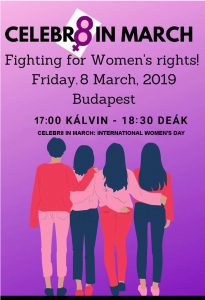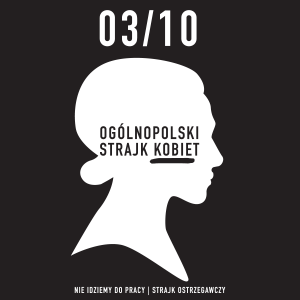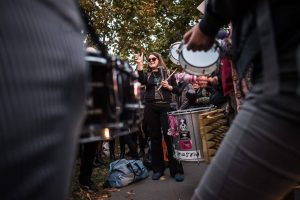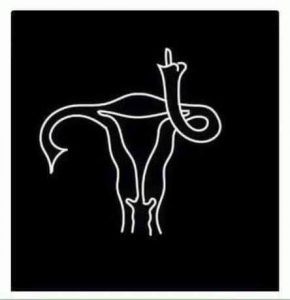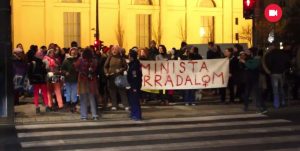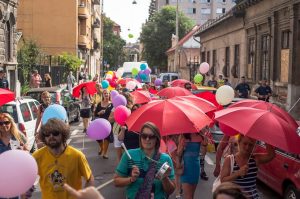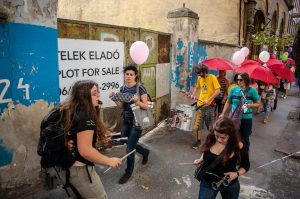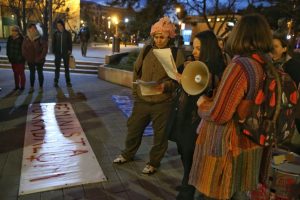
English below
A március 8-as felvonulás alkalmat ad arra, hogy nemzetközi figyelmet követeljünk annak, ami láthatatlan: a nőkkel szembeni diszkrimináció és elnyomás elfogadhatatlan renszerének a társadalmunkban. Március 8-án a patriarchátus ellen tüntetünk, akár liberális, akár illiberális államban valósul meg, és a kapitalizmus, nacionalizmus, rasszizmus, xenofóbia, transzfóbia, szexizmus, specizmus és fasizmus ellen. Március 8-a jó alkalom arra, hogy magunkra irányítsuk a figyelmet, a mi küzdelmeinkre, és jobban megérthessük a helyzetünket nőként, akár szexualitásunk, gender identiásunk összefüggésében, akár rassz vagy osztály viszonylatában.
Hogy ki a nő? Nincsen egyszerű, összefoglaló válasz, annyiféle női életútra gondolhatunk — csak gondoljatok az előbbi paraméterekre: vannak nem-heteroszexuális nők, transz nők, a többségtől különböző bőrszínű nők – gondoljunk most a roma nőkre, vannak szegénységben élő nők, hajléktalan nők, migráns nők, munkanélküli vagy prekárius munkát végző nők, s a fizetésben nem részesülő termelő munkát véző nők – vagyis a háziasszonyok.
Mennyire érezzük magunkat közösségben azokkal a nőkkel, akik e kategóriákba tartoznak? Vajon elképzelhetünk-e egy olyan közös demonstrációt magyarországon, ahol mindezen nők képviselői egymás mellett állnak?
Van, aki úgy gondolja, a “nő” nem közös nevező. De nem hiszem, hogy ezért vagyunk most kevesen. A lényeges kérdés valójában az: tudunk-e együtt tettrekészek lenni és cselekedni? Hogyan tudunk politikai akciókat végrehajtani? És, vajon mi magunk magunk fenntartjuk-e választóvonalakat, hierarchiát nő és nő között? Az a társadalmi egyenlőtlenség, amelyet a nők tartanak fenn, ugyanaz a mód, mellyel a társadalom egésze foganatosítja az elnyomást, s amelyek formáit már említettem: rasszizmus, homofóbia, idegengyűlölet, transzfóbia, nacionalizmus. A nők is szolgálják ezeket! Mi magunk is fenntartjuk a bennünket elválasztó erőket! Fenntartjuk a szegregációt nő és nő közt, szolgáljuk a hierarchiát, ha nem nézünk a lábunk elé és alá, nem tudatosítjuk magunkban, hol állunk, mi a pozíciónk, és mik a privilégiumaink; ha nem hagyjuk magunk mögött a helyzetünkkel járó biztonságot, a heverőt, a családi hátteret, a társadalmi szerepünket, kényelmes identitásunkat; ha nem válunk kritikussá azokkal az ideológiákkal szemben, amelyek újra bebörtönzik a nőket – még azután a hosszú küzdelem után is, amit már végrehajtottunk.
Hadd illusztráljam ezt a nők közti egyenlőtlenséget egy hétköznapi példával. Van-e a magyar társadalomnak egyetlen olyan szelete, ahol előnyösebb roma nőnek lenni, mint nem-romának? Nos, van egy. Nem is rejtem el az iróniát – ez az egy az abortuszhoz való jog! A roma nők könnyebben hajthatnak végre abortuszt, kevesebb akadállyal szembesülnek eme alapjog gyakorlásakor, mint a nem-roma nők. Vizsgáljuk hát meg a skatulyáinkat és kategóriáinkat, szembesüljünk privilegizált helyzetünkkel. De ne keverjük össze a privilégiumokat és az alapjogokat. Az abortuszhoz való jog alapjog! Ahogyan a férfiakéval egyenlő fizetés is alapjog!
A nők közötti szolidaritás keresése az, amely a történelem folyamán a leginkább előmozdította a feminizmust, s amely arra sarkallt, hogy előbbre lépjünk, cselekedjünk radikálisabban. Először a saját álláspontunkkal kell szembesülnünk, megértenünk helyzetünk realitását, és kialakítani a cselekvési tervet; majd pedig kilépni a fedezékből, saját kalickánkból, és szolidaritást vállalni azokkal, akik a jólétért és méltóságért küzdenek – ez a személyes és politikai feminista forradalom alapja. Mert forradalomra van szüksgé ahhoz, hogy a nők helyzete változzon. Induljunk most együtt erre az útra!
***
with these few words i want to address us attending here, not the public
we, the few gathered here, are each representatives of our own life, of our own group, of our own political belonging.
for this reason, we couldn’t be more different. i even think we understand the term women differently. the 8th of march demonstration is a protest against patriarchy, be it liberal or illiberal! capitalism, nationalism, racism, xenophobia, homophobia, transphobia, sexism, specism and fascism. we have, like many women around the world today, take a stand to draw transnational global attention towards the invisible: the unbearable systems of discrimination, opression and repression of women in our societies. be it in relation to our sexualities, gender identity, our race, our class, political persuasion or other personal circumstance. this said is enough to know that we should be much more of us demonstrating here today. this said, we want to see again the 8th of march having more meaning to more of us!
the term women is not unified nor simple. just take into consideration those parameters that i have just mentioned: non-heterosexual women, lesbian women, trans women, women of colour, mostly i have roma women in mind, then poor and homeless women, migrant women, unemployed and precarious women workers, the workers of the unpaid reproductive work – the houswifes, the battered women. how much do we think we hold in common? how much do we need to hold in common to protest together? is it possible that all the activist of those groups in hungary can stand at the same feminist demonstration one day?
our difference means that we have different privileges. we perpetuate segregation and hierachies among women ourselves if we don’t manage a little trick of looking under our own feet, our own stand, acknowledging our own situatuions, positions, priviliges: if in our mindset we don’t leave the safety of our backgrounds, sofas, families, social roles, identities and individualities if we can’t be critial about the ideologies that emprison women even after such a long struggle as we have already faced.
let me illustrate the inequality among the category of women themselves by a simple everyday example: is there a single area in hungarian life that we can think of, that is actually more beneficial to roma women than the other, whites?
yes, there might be one. with unhidden irony, i have to admit, this is unbarriered access to the abortion right! there roma women have “better access”, and are granted the procedure that is our human right with less obstacles than white women are. while an average procedure at the ethical comitee for a white woman with three children lasts for half an hour, it will be done for a young, yet childelss roma woman in ten minutes. when speaking of priviliges, we should not confuse them with our rights! access to abortion and contraception is our right! fair payment is not a privilege either, it is our right.
none of us was born woman but became one, which above all means: that we can strive to change it all! we can create what woman means, we can create what it means to live as a woman. and also, what it means to act politically as a woman. there is no destiny asigned for us that we can’t surpass.
this said is enough to urge us to think over our boxes, across and through our privileges, fixed positions, like victimhood, for example and decide to act differently, on different grounds.
to seek and establish solidarity with other women is what has already throughout the history made a greatest change in the course of feminisms, and have pioneered the step further, the more radical step. we certainly need to start from our own position. but then we need to reach out to the others.
once we do this, we can symbolically, step behind our shadow.
to step over one’s shadow, to see beyond one’s blind spot, to surpass one’s own cages of privileges or disprivileges, this is, to be able to solidarise with others struglling for their well being and dignity. and it also means to be solidarious to oneself! this is an essential part of the personal and the political feminist revolution. though none of us was born woman, it is still no less than revolution of that it takes for the position and situation of women to change.
welcome to such journey that we will mark with this march.
